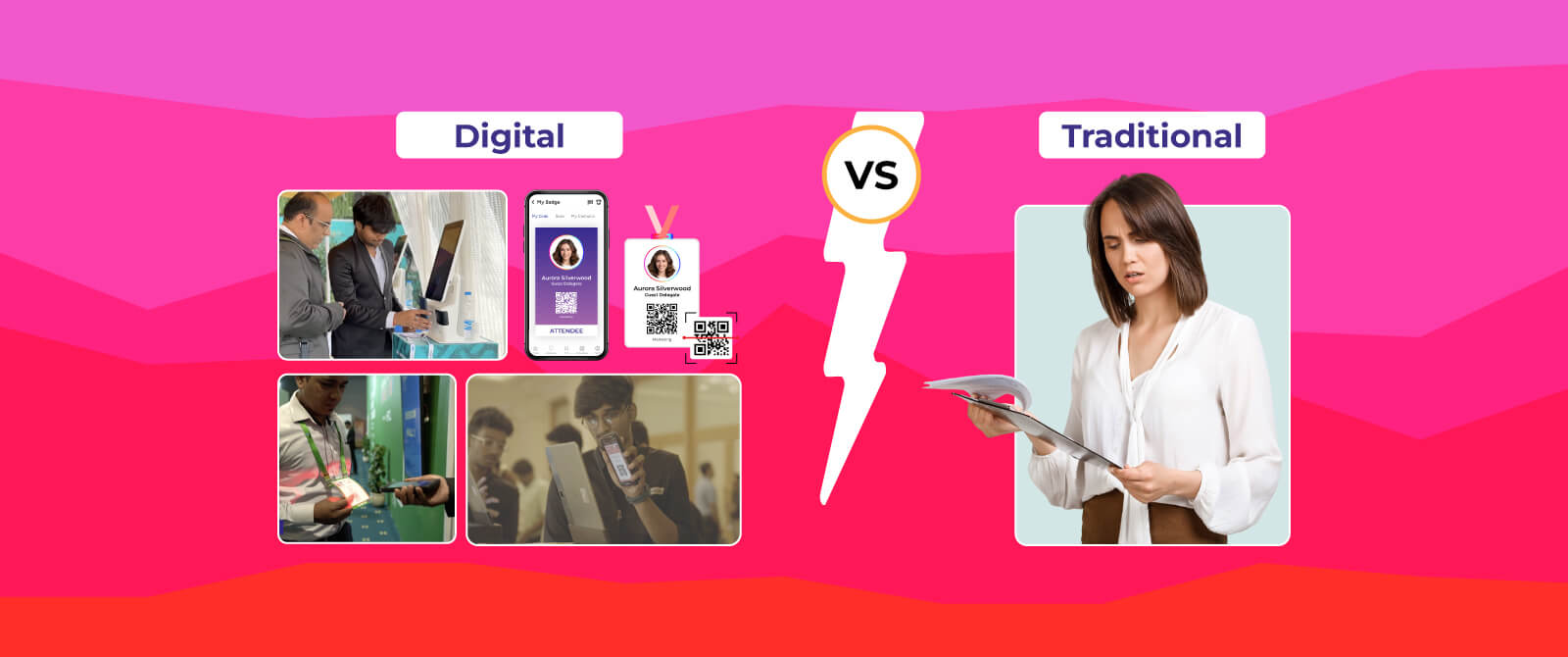Event planning is a crucial process that determines the success of any gathering, whether it’s a corporate seminar, trade show, or music festival. Traditionally, event planning was done manually, involving a lot of paperwork, in-person meetings, and on-site coordination. However, with the rise of digital event planning, organizers now have access to event tech solutions that streamline event registration, attendee engagement, and security.
But which approach is better? Should you stick to traditional event planning, or is it time to embrace digital event planning? In this blog, we’ll explore the differences, benefits, and challenges of both methods to help you decide the best strategy for your next event.
Table of Contents
Understanding Traditional Event Planning
Before technology became a major part of event management, organizers relied on traditional event planning methods. These included physical invitations, paper tickets, and manual guest check-ins.
What is Traditional Event Planning?
Conventional event planning is the term used to describe the traditional method of event organization, which mostly depends on physical tools, in-person contacts, and manual coordination. Before the development of technology, all facets of event administration were done by hand, including sending out invites, selling tickets, checking guests in, and gathering feedback.

Key Features of Traditional Event Planning
Manual Event Registration
Attendees register via phone calls, emails, or paper forms.
Data is stored in physical files or spreadsheets, requiring manual tracking.
Printed Invitations & Tickets
Invitations are mailed or handed out in person.
The attendees are arriving with printed tickets at the entrance of the event.
Event organizers often use physical badges or wristbands for identification and access control.
On-Site Event Management
Staff manually check attendees against printed guest lists.
Organizers handle all coordination through direct communication and paperwork.
Any last-minute changes, such as guest additions or seating adjustments, are managed manually, often leading to delays.
Limited Event Access Control
Security personnel rely on wristbands, ID checks, and printed guest lists.
No real-time tracking of attendee movement.
Feedback Collection via Paper Forms
Attendees fill out surveys or provide verbal feedback.
Data analysis is done manually.
Gathering and processing feedback takes longer.

Advantages of Traditional Event Planning
Personal Touch: The Personal touch that is encouraged by conventional event planning is one of its strong points. Because of the direct interaction, there is a greater likelihood of having genuine interactions between the organizers, guests, and vendors.
Most Reliable for Small Events: Classic planning is usually the way to go for small, intimate events, like weddings, family events, or private meetings. These types of events don’t require complex event tech solutions or digital ticketing. Instead, personal invitations, printed name tags, and direct communication with vendors are usually enough.
Familiar Process: Many people, including event organizers, vendors, and guests, are already comfortable with traditional event planning methods. There are no hassles with developing new technology or dealing with tool, as the attendees can just call to RSVP and receive a printed invitation to check in, as well as print their tickets, all without any connection to the internet or mobile apps.
Challenges of Traditional Event Planning
Time-consuming: Planning events can take a lot of time because everything is done by hand. From registering visitors to checking them in and gathering feedback, it can drag on. Plus, the costs add up quickly with the old-school way of doing things. You have to print invites, send tickets, pay for extra help with sign-ins, and rent a place for the meetings.
Limited Data and Insights: Without digital tools, it’s tough to track things like attendance and what people want. Organizers usually have to rely on paper sign-in sheets or ticket stubs, which don’t give any real-time info.
challenging to scale: It just becomes more difficult to handle things manually as the number of guests increases.
The Shift to Digital Event Planning
The shift to technology improvements has given digital event planning a new dimension and centralized many event management-related tasks. Today, event organizers use event registration technology, mobile apps, and cloud-based tools to streamline the process.
What is Digital Event Planning?
Digital event planning uses technology to simplify and automate event administration. Using event registration technology and event tech solutions, organizers may automate the whole event lifecycle, from registrations and promotions to attendee engagement and post-event analysis.

Key Features of Digital Event Planning
Online Event Registration & Ticketing
Attendees register through event websites, mobile apps, or social media.
Digital tickets with QR codes replace paper-based entry passes.
Automated confirmation emails and reminders keep attendees informed about event details.
Automated Event Access Control
QR codes, NFC wristbands, and facial recognition speed check-ins.
Secure entry permits only authorized visitors to gain access.
Event Management Platform & Mobile Apps
Organizers use event tech platforms to manage schedules, logistics, and communication.
Attendees access event details, maps, and networking features via mobile apps.
Event applications offer real-time information, push notifications, and interactive engagement features such as live polls and Q&A sessions.
Real-Time Data & Analytics
Organizers use dashboards to keep track of registrations, attendance, and engagement.
Digital surveys and live polls allow for instant feedback collection.
Virtual & Hybrid Event Capabilities
Events can be hosted online, in-person, or as a hybrid mix.
Live streaming, digital networking, and interactive Q&A sessions enhance engagement.
In-Person Events!
Simplified Event Planning and
Execution With Our Event Tech Suite

Advantages of Digital Event Planning
Efficiency: One of the biggest advantages of digital event planning is that it automates many time-consuming tasks. Instead of manually registering attendees, printing guest lists, or verifying tickets at the entrance, everything is handled digitally.
Cost Savings: Traditional event planning involves a lot of costs, such as printing invitations, mailing tickets, hiring extra staff for on-site check-ins, and managing manual data entry. With digital event planning, these expenses are significantly reduced.
Scalability: Digital event planning makes it easy to scale events, whether you’re hosting a small business seminar or a massive international trade show.
Enhanced Security: Security is a top priority for any event, and digital event planning offers strong event access control solutions. Instead of relying on paper guest lists or ID checks, digital methods like QR codes, NFC wristbands, and facial recognition provide a secure way to verify attendees.
Data-Driven Decisions: With event tech solutions, organizers get real-time insights into attendee behavior, registration trends, and engagement levels.
Challenges of Digital Event Planning
Technical Barriers: Digital tools will not be accessible to the event organizers and the attendees.
Dependency on Internet & Devices: Poor internet connection can ruin the event experience.
Less Face-to-Face Interaction: Networking through virtual means does not bring humans as close as might be expected.
How Event Tech Solutions Improve Event Management
Modern event tech solutions have completely changed the way events are planned and executed. From AI-powered networking tools to interactive mobile event apps, technology simplifies the event experience for both organizers and attendees.
Benefits of Event Tech Solutions in Digital Event Planning
Faster & Smoother Event Registrations
No long queues or manual data entry—attendees sign up in seconds.
Secure digital ticketing reduces fraud risks.

Automated Communication & Engagement
AI chatbots and automated emails keep attendees informed.
Push notifications in event apps remind attendees about schedules and sessions.
Personalized Attendee Experience
AI matchmaking shows you networking opportunities that fit your needs.
Custom event apps provide schedules, speaker bios, and interactive maps.
Personalized notifications and content recommendations enhance engagement.
Better Security & Event Access Control
QR codes and NFC wristbands speed up check-ins.
Facial recognition enhances security at VIP areas.
Real-time access tracking helps organizers monitor attendance.
Seamless Data Collection & Insights
Event organizers measure their success via real-time analytics.
Feedback from digital surveys is received immediately after the event.
Data reports can be used to enhance future strategies for events.
Event tech solutions can track and analyze session check-ins, booth visitations, and networking activities.
Comparing Traditional vs. Digital Event Planning
Event planning has changed over the years. It has both traditional and digital methods, with each having its advantages. Digital event planning is all about taking events to the next level by utilizing technology to conduct business and by improving the reimagined attendee experience. Traditional event coordination, on the other hand, demands that some members physically attend sessions. Let’s compare both approaches to see which one fits your event needs best.
| Feature | Traditional Event Planning | Digital Event Planning |
| Registration Process | Manual, time-consuming | Quick, automated |
| Ticketing | Physical tickets | Digital tickets with QR codes |
| Event Access Control | Wristbands, ID checks | QR scanning, NFC, facial recognition |
| Attendee Engagement | Paper-based materials, face-to-face networking | Event apps, live polls, and AI matchmaking |
| Security | Guest lists, manual checks | Digital access control, real-time tracking |
| Cost | High due to printing, staffing, and logistics | Lower costs due to automation |
| Scalability | Limited to small/medium events | Easily scales to global audiences |
| Sustainability | High paper waste, logistics costs | Eco-friendly, reduces carbon footprint |
When Should You Choose Traditional vs. Digital Event Planning?
While digital event planning is more efficient and cost-effective, there are still cases where traditional event planning may be the better choice.
Choose Traditional Event Planning If:
Your audience prefers personal, face-to-face communication.
The event is small, localized, and does not require advanced technology.
You want a more personal and intimate atmosphere.
Your budget allows for printing, staffing, and manual processes.
You don’t need real-time attendee tracking or data analytics.
Choose Digital Event Planning If:
Your event has a large or international audience.
You want to automate registrations, ticketing, and attendee engagement.
Security, data tracking, and scalability are key priorities.
You need instant updates and flexible event management.
Your goal is to reduce costs and minimize paper usage.
You want interactive features to boost attendee engagement.
Conclusion: Which One is Better?
The best approach depends on your event’s needs. Traditional event planning is great for smaller, personal events where a human touch is important. However, digital event planning offers unmatched efficiency, cost savings, and scalability, making it the better choice for large-scale and tech-driven events.
Most events benefit from a hybrid strategy, which combines conventional aspects with event technology solutions. Whether you’re organizing a conference, trade show, or corporate meeting, leveraging event registration technology and event access control can make your event more seamless and successful.
Whichever method you choose, proper planning and the right tools will ensure a smooth and memorable event experience for your attendees!





















